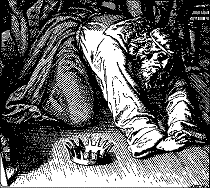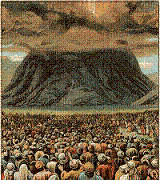The handout for the Bible study tomorrow:
HEBREWS 11:1—22 Bible Study (Date: June 26, 2010)
Introduction: The Apostle is writing to believers undergoing severe difficulties and hardship. He points to faith as the means of overcoming (1 Jn. 5:4) every sort of trial and temptation that may come their way. He then employs both the teaching tools of abstraction and particularization to fortify his point: Abstraction meaning theological truths, or doctrine, that form the basis of the particulars, which are the outworkings in history or "real life" of doctrine (application). The point is made that orthopraxy follows orthodoxy.
11:1:
The Apostle is not so much as giving a complete definition of faith than a part of it that is preferential to the making of his point (see Introduction). Calvin notes that a key element of faith is patience: "...faith can be no more separated from patience than from itself...We shall not reach the goal of salvation except we have patience, for the prophet declares that the just lives by faith; but faith directs us to things afar off which we do not as yet enjoy; it then necessarily includes patience" (Commentary on Hebrews 11).
Faith has both objective and subjective components. The objective component of faith is that which is true no matter if you or I believe it. This is Jesus Christ, the object of our faith—the substance—and included in Him are all His benefits. What are these benefits? Justification, sanctification, and glorification. It is when we lay hold of Christ and His benefits that faith becomes subjectively active in us. Faith demonstrates to us, gives us evidence, that the promises of God are confirmed and find validation in Christ (2 Cor. 1:20).
Faith, then, bridges the "already" and "not yet" tension of the Christian life:
"...for the Spirit of God shows to us hidden things, the knowledge of which cannot reach our senses: Promised to us is eternal life, but it is promised to the dead; we are assured of a happy resurrection, but we are as yet involved in corruption; we are pronounced just, as yet sin dwells in us; we hear that we are happy, but we are as yet in the midst of many miseries; an abundance of all good things is promised to us, but still we often hunger and thirst; God proclaims that he will come quickly, but he seems deaf when we cry to him. What would become of us were we not supported by hope, and did not our minds emerge out of the midst of darkness above the world through the light of God’s word and of his Spirit?" (Calvin, Commentary on Hebrews 11).
11:2—3:
The forefathers of the Church were approved by God, justified in His sight and counted as righteous, on no other basis than faith. The Apostle is remphasizing the point that merely being a part of the Jewish nation does not make one a Jew in the true sense of the designation (Rom. 2:28), and therefore all grounds for boasting on the basis of merely national ties to Abraham are excluded on the virtue of faith.
We acknowledge by faith that everything in reality was fashioned by God for His own intents and purposes. The word used for "created" also includes the meaning of intentional design, so we see that God in His wisdom and creative power made things as they are, upon which He placed His stamp of approval of "good."
The "invisible things" on which the whole created order is based are the excellencies of God that are apparent in His creation (Rom. 1:20). "God has given us, throughout the whole framework of this world, clear evidences of his eternal wisdom, goodness, and power; and though he is in himself invisible, he in a manner becomes visible to us in his works" (Calvin, Commentary on Hebrews 11).
11:4—6:
Abel's sacrifice was accepted by God not because it was a blood sacrifice, and Cain's was "of the fruit of the ground" or "vegetarian," but because he already had faith prior to his act of offering. It may be said here that his faith, which is evidence of God's favor prior to any good work on his part, was proved real by his righteous action. Cain was not as favored of God and therefore incurred His judgment. Therefore, Abel still speaks the word of faith, though dead, by magnifying the favor of God that is had through faith, as evidenced, in part, by God taking vengeance on account of his death, for "Precious in the sight of the Lord is the death of his saints" (Ps. 116:15).
Enoch pleased God, by faith, and because of this was given the privilege of not tasting the kind of death that is common to man. Calvin describes this "translation" or being "taken up" as "a sort of extraordinary death; nor let us doubt but that they were divested of their mortal and corruptible flesh, in order that they might, with the other members of Christ, be renewed into a blessed immortality" (Commentary on Hebrews 11).
Now the impossibility of pleasing God without faith appears in the aforementioned fact that faith has an object, namely God. God, as the object of our faith, exists outside of ourselves, and the recognition of His existence (His objectivity) is critical to our subjective experience of Him. Our subjective experience is reinforced with the knowledge that He is favorably disposed towards us, and that He will reward our seeking of Him. As Calvin notes, "we must believe that God is, and that we ought to feel assured that he is not sought in vain" (Commentary on Hebrews 11). Also:
"For it is not to be laid down as an abstract principle, that God is a rewarder to those who seek him; but every one of us ought individually to apply this doctrine to himself, so that we may know that we are regarded by God, that he has such a care for our salvation as never to be wanting to us, that our prayers are heard by him, that he will be to us a perpetual deliverer. But as none of these things come to us except through Christ, our faith must ever regard him and cleave to him alone" (Calvin, Commentary on Hebrews 11).
And,
"...for the only true end of life is to promote his glory; but this can never be done, unless there be first the true knowledge of him. Yet this is still but the half of faith, and will profit us but little, except confidence be added. Hence faith will only then be complete and secure us God’s favor, when we shall feel a confidence that we shall not seek him in vain, and thus entertain the certainty of obtaining salvation from him" (ibid.).
11:7—12:
Noah, after receiving the word from God that a global flood would ensue in 120 years and that he must build an ark to save himself and his family, in faith, acted upon the command. What were the obstacles that his faith had to overcome? Firstly, the proposition of a deluge on as massive a scale as that foretold by God, and the means of salvation for him and his family through a gargantuan ark is, to the common human mind, very outrageous and quite implausible. His faith looked to the unseen and improbable as if it was going to be as real as tomorrow's sunrise on the virtue that if God said it would happen, it would certainly happen. Secondly, the length of time from the announcement to the actual fulfillment might have caused the common man to slack off and forsake diligence. Noah's faith fitted him with a sense of urgency so as to put his hands to prompt hard labor. Lastly, it is a certainty that the wicked that surrounded him must have constantly persecuted him for the foolishness of his endeavor and his refusal to indulge the pleasures of the world with them. His faith that overcame the persecutions and temptations of the world typifies the experience of everyone called by God.
Here it must also be observed that reverent fear in the impending judgment of God is a component of the faith that is approved by Him. Calvin says that "there is no reason why faith should not look to God and reverently receive whatever he may say; or if you prefer another way of stating the subject, it rightly belongs to faith to hear God whenever he speaks, and unhesitatingly to embrace whatsoever may proceed from his sacred mouth. Thus far it has regard to commands and threatening, as well as to gratuitous promises" (Commentary on Hebrews 11).
Noah's obedience in building the ark, in the travail and suffering involved, is contrasted with the wicked's ease and sinful revelry, and highlights the justice in the latter's destruction. Given that God, in His mercy and foreberance, favors the company of the wicked if a righteous man is among them, the ark is the seal of their impending doom.
Abraham is "the chief father of God's church on earth" (Commentary on Hebrews 11) according to Calvin, but this distinction is his only because of his faith for "he had no excellency which did not proceed from faith" (ibid.). In fact, before God's call, Abraham worshipped idols; but after the call to leave the land beyond the Euphrates for the land of Canaan, his faith in the one, true God was exercised in that he trusted the promise of the land, which he knew not the whereabouts, as an inheritance. It is no small thing to leave the land which has been one's home for a significant amount of time for an unknown land, being assured only on the ground of faith in God's promise, but such is the faith of Abraham. And even when he and his family have already set foot on Canaan, it was not theirs to claim and possess then and there, for indeed they dwelled in tents. But the land that Abraham looked to and hoped for was not a land seen with physical eyes, but heaven itself! "It was no doubt a great thing to cherish in their hearts the assurance given them by God respecting the possession of the land until it was after some ages realized; yet as they did not confine their thoughts, no, not to that land, but penetrated even into heaven, it was still a clearer evidence of their faith" (Calvin, Commentary on Hebrews 11).
Sarah, Abraham's wife, was also commended for her faith in believing that she would conceive of a child through whom the promise was to be reckoned, though initially her doubts were expressed in a reaction of laughter to the angel's announcement. It would appear that even the faith that falters is of value in God's sight, provided it not plunge headlong into unbelief; hence Calvin asserts, "that when our faith in some things wavers or halts, it ceases not to be approved of God, provided we indulge not the spirit of unbelief. The meaning then is, that the miracle which God performed when Isaac was born, was the fruit of the faith of Abraham, and of his wife, by which they laid hold on the power of God" (Commentary on Hebrews 11).
Therefore, through the faiths of both Abraham and Sarah, the nation of Israel was built; but more than that, the Church of Christ, since it is the Church that is the true Israel of God, from the O.T. to the N.T., since the reckoning of membership in Israel is by faith.
11:13—16:
The patriarchs all died having their sights set, in faith, to the future fulfillment of the promises, for indeed they were looking to its consummation in Christ. When all they had were mere "samplings," still, their faith remained strong until death, as though they already had the fulfillment in their possession. This faith obscured the attraction and magnetism of the world and its pleasures so that they counted themselves as pilgirms passing through, destined for their true home in heaven, both after death in a disembodied state, and in the second coming of Christ when all those who have longed for His appearing shall be resurrected to glory, in the inheritance of a New Earth. This reminds us, who are now in possession of the full revelation of Christ, that we, in fact, have more reason to have faith and exercise it, since the fathers who had lesser light did so in tremendous fashion.
Because of faith, God identified Himself with the patriarchs through the appending of their names to His, "I am the God of Abraham, the God of Isaac, and the God of Jacob" (Ex. 3:6).
"We are hence to conclude, that there is no place for us among God’s children, except we renounce the world, and that there will be for us no inheritance in heaven, except we become pilgrims on earth; Moreover, the Apostle justly concludes from these words, — 'I am the God of Abraham, of Isaac, and of Jacob,' that they were heirs of heaven, since he who thus speaks is not the God of the dead, but of the living" (Calvin, Commentary on Hebrews 11).
11:17—22:
Of all the trials of Abraham's faith, the offering up of his son, Isaac, must have been the greatest. As Calvin notes, "Abraham had indeed already proved what he was, by many trials; yet as this trial surpassed every other, so the Apostle would have it to be regarded above all his trials. It is then as though he had said, 'The highest excellency of Abraham was the sacrificing of his son:' for God is said to have then in an especial manner tried him" (Commentary on Hebrews 11). Perhaps only a father could know the gravity of this test. Imagine the agony of soul Abraham must have felt as they went on a three-day journey, looking unto Isaac those days, knowing that at the end of the road there awaited a bloody death for his beloved son—and that by his own hands. And fathom the knife that cut through his heart as Isaac inquired, "Where is the sacrifice, dad?" "The death of a son, under any circumstances, must have been very grievous, a bloody death would have still caused a greater sorrow; but when he was bidden to slay his own, — that indeed must have been too dreadful for a father’s heart to endure; and he must have been a thousand times disabled, had not faith raised up his heart above the world. It is not then without reason, that the apostle records that he was then tried" (ibid.).
We may ask what the need was for this extreme test; hasn't Abraham already proven himself in times past? One thing to realize is that God already knows our hearts even before He tries us. The trial is not to add to God's information but to ours, revealing to ourselves and others the current state of our hearts, and in the case of Abraham, a solid faith, for the praise of His glory. And this faith wavered not in laying hold of the promise that it was through Isaac that his descendants would be reckoned, as evidenced by the reasoning employed by Abraham in that God was able to raise his son from the dead, after he had obeyed, so as to fulfill the promise given in the perpetuation of his line. In a manner of speaking, Abraham did receive Isaac back from the dead, for in his willingness to offer him up, driven by faith, it is as if he had indeed sacrificed him.
The faith of the father was produced in the son, and, in faith, Isaac looked to things unseen, far along in the future, and blessed his sons. Note that Isaac possessed nothing and had not the power to influence the future except in the conferring of the word of God to his children. He held on to the promises given to Abraham and these he passed on to his own children. In Jacob, as the chosen of God by which the fulfillment of the promises would progress, was this faith declaration most keen, and in the distinction between him and the reprobate elder sibling, Esau, who had the birthright but forfeited it, as decreed by God.
As with his father, Jacob blessed Joseph's sons even as yet not having the earthly power or rightful dominion over the promised land, and this by faith. Also, the same preference over the younger (as in the case of Isaac) in Ephraim is witnessed, in a breaking of tradition that could only have been motivated by faith in the promises of God. As a dying man, the strength of his faith, though his body weak, comes across powerfully, in this final act of worship and blessing.
Last among the patriarchs is Joseph, who by his faith in the promises of God, ordered that his bones be brought along in the future exodus of his people, thereby proclaiming his status as a pilgrim and one who esteemed not the glories of Egypt or this world (not even Canaan) but heaven.

































